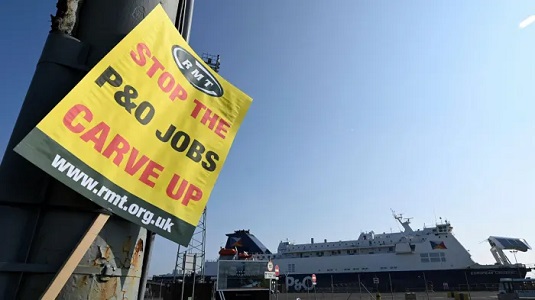
What is true of the papers is true of the Tories themselves. The problem with pretending to be the party of hard work, of promising jam tomorrow means you are expected to provide bread and butter today. And since Brexit, bad economic news has been unremitting. Energy price rises, cost of petrol, food inflation, Boris Johnson can repeat the "fastest growth in the G7" all he wants - people are seeing the costs every time they look at their supermarket receipts. Because the Tories are vulnerable here transport secretary Grant Shapps has been forced to move. One, because they're on the hook of public opinion for this. There's no chance of blaming RMT militancy and expecting to be believed. And second, other ferry services were darkly hinting they were about to follow suit. Suddenly, a problem with a single employer might become a sector-wide issue. And with public sympathy already in organised labour's corner, the spectre of a popular repoliticisation of industrial relations and the fallout from that is on the cards. This has forced the Tories on from mealy-mouthed support for the P&O workers to doing something we don't often see: giving a concession.
After condemning P&O last week and launching a review into services it supplies the government, Shapps took to the Commons to stop the rot. This Monday afternoon he sent Hepplethwaite an ultimatum: offer back the old workforce their jobs, or get hit with a regulatory package to tighten up employment rules for seafarers. The only named measure would be the introduction of the minimum wage on British ferry routes - a measure that would cut into the savings P&O were hoping to make, but not enough to render them null and void. Apart from that, Shapps's statement in front of MPs was fairly vague, with promises to prevent this from happening again. And so the Tories are providing a pay floor for workers, but beyond that?
This is where they are in a real bind. As we gave seen with last week's statement and the Tories' announcement that they were not doing anything substantive about energy bills, this is a government that doesn't want to be seen cleaving to popular pressure. Where action is unavoidable, the immediate instinct is to snatch back what has been given. We've seen this with Rishi Sunak's compulsory loan to help with energy price increases, and we've seen it inflect the Tory management of the pandemic with the rush to normality. However, while political necessity is forcing the Tory hand there's a triple danger in the P&O case. The first is overriding an individual company's right to manage. If that happens here, why not other businesses? There's the government affirming that workers should be treated with dignity, effectively valorising a line of attack trade unionists don't use enough. And lastly, potentially - depending on what Shapps comes up with - the redrawing of employment regulation that increases security at work and is a positive collective reform. The problem for hyper-class conscious Tory politicians is that anything, even the most meagre concession is a seed from which future difficulties can sprout. Especially when it comes to trade unions and employment relations.
This then is an instance of the Tories acting for the general interest of their class. The political consequences of the cost of living crisis are difficult to divine right now, but the Tories certainly don't want it to spread into a generalised legitimation crisis. And so clamping down on one "rogue" company making a mockery of Britain's pitiful employment laws is about retaining the present balance of class relations as a whole. It's either do nothing and risk an explosive conflagration of dissent, or do a little bit and keep things on an even keel, while ever so slightly empowering workers. An invidious moment for the Tories then, but a potentially propitious one for the labour movement.
Image Credit
No comments:
Post a Comment